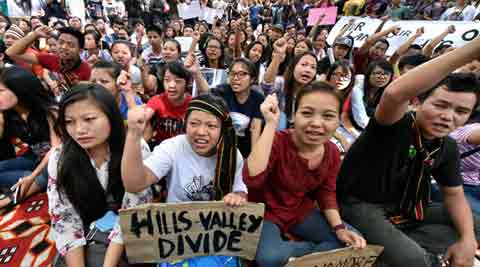
NRC demand poses challenge to Central policies in Manipur
Nirmalya Banerjee, EOI, Kolkata, 16 May 2023 : The current spate of ethnic violence in Manipur involving mostly the Meitei and the Kuki communities has once again thrown a new challenge to the N. Biren Singh government to preserve the integrity of the state.
Leaders of the Kuki community in Manipur have demanded a new administrative unit for the Kuki people, though Chief Minister Biren Singh has ruled out any such possibility and said the integrity of
Manipur will be maintained at any cost. The situation at the ground level indicates ,however, that much effort will have to be made before ethnic amity can be restored.
The ethnic violence that rocked parts of Manipur in the first week of May is, however, not the first ethnic violence that Manipur is witnessing; nor is it the first challenge to the integrity of the state. In the decade of 1990s, Manipur has witnessed brutal clashes between the Naga and the Kuki communities; and also Kuki –Paite clashes.
Later in the beginning of the 21st century the demand for integration of the Naga-dominated hill areas of the state with Nagaland posed a challenge to the territorial integrity of Manipur.
This possibly, is the first time, however, that there is a demand for territorial separation purely on ethnic grounds.
As many as 10 MLAs belonging to the Kuki community, among them eight from the ruling BJP and two from BJP ally Kuki People’s Alliance, in a Press statement on May 12, demanded from the Centre “a separate administration under the Constitution of India and right to live peacefully as neighbours with the state of Manipur.”
A Manipur Minister from the Kuki community was also a signatory to the statement. They said “the Manipur government has miserably failed to protect us.” Members of the Kuki community have described the sudden outbreak of violence as “ethnic cleansing.”
Organizations of the Meitei community have largely blamed the unchecked immigration of people of the Kuki community from neighbouring Myanmar, resulting in a change in the demographic structure of Manipur, along with the simultaneous increase in poppy cultivation in reserve forest areas in the Kuki-dominated districts of Manipur, for the violence and have blamed militant groups owing allegiance to the Kuki community for attacking people of the Meitei community.
Some of these militant groups have taken advantage of the suspension of operation agreements with security forces to stockpile sophisticated weapons which they have used while moving out of their designated camps.
“Until and unless the Kuki militants under SoO with the Government of India are controlled, it will be hard to bring back normality in the State,” the All Manipur Students’ Union, the Manipuri Students Federation, the Democratic Students’ Alliance of Manpur, the Kangleipak Students’ Association, the Students Union of Kangleipak and the Apunba Ireipakki Maheiroi Sinpanglup have said in a joint statement.
Professor Bhagat Oinam of Jawaharlal Nehru University, in a Press conference in Delhi last week, on the other hand, described the ethnic violence as a “well-organized conspiracy” and blamed the drug mafia for being behind it; their interest having been affected by the drive launched by the Manipur government against illegal poppy cultivation.
Ethnic unrests in Manipur have usually been associated with activities of different militant groups, often owing allegiance to particular ethnic population groups. In the past, people of the Kuki community have been on the receiving end of the activities of a valley-based militant outfit in the Chandel and Churachandpur districts.
The growing demand for the drawing up of a National Register of Citizens in Manipur has called into question the efficacy of policies pursued by the Centre in Manipur.
“The Government has turned a blind eye to the influx of illegal immigrants and implementation of NRC in the State,” the six student bodies have said in the joint statement.
On March 29, thousands of women from three all-women run markets of Imphal took out a rally to the office of the Chief Minister, demanding a NRC. Chief Minister Biren Singh said on March 31 the Manipur government was ready to introduce the NRC, but for this the approval of the Centre was required.
Delhi has, however, already brought Manipur under the ambit of the Inner Line Permit in the wake of the anti-Citizenship Amendment Act agitation; to check influx and ensure protection of the indigenous population of the State.
The Naga-dominated hill areas of Manipur have remained peaceful, but Delhi cannot lose sight of the reality that it has not yet been able to come to an agreement with the powerful militant outfit National Socialist Council of Nagaland (Isaac-Muivah) that still has the demand for the formation of a Greater Nagalim comprising Nagaland and the hill areas of Manipur, say observers. NRC demand poses challenge to Central policies in Manipur, say observers.

0 Response to "NRC demand poses challenge to Central policies in Manipur"
Post a Comment
Disclaimer Note:
The views expressed in the articles published here are solely those of the author and do not necessarily reflect the official policy, position, or perspective of Kalimpong News or KalimNews. Kalimpong News and KalimNews disclaim all liability for the published or posted articles, news, and information and assume no responsibility for the accuracy or validity of the content.
Kalimpong News is a non-profit online news platform managed by KalimNews and operated under the Kalimpong Press Club.
Comment Policy:
We encourage respectful and constructive discussions. Please ensure decency while commenting and register with your email ID to participate.
Note: only a member of this blog may post a comment.